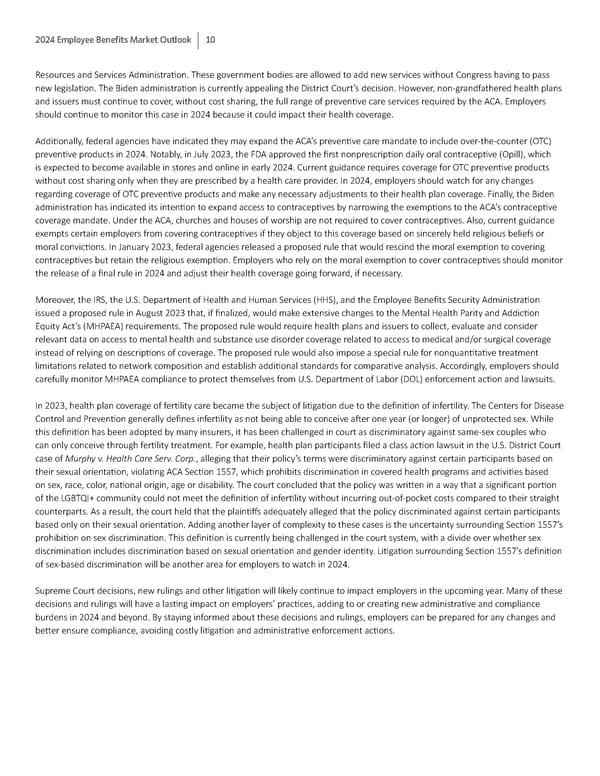2024 Employee Benefits Market Outlook 10 Resources and Services Administra琀椀on. These government bodies are allowed to add new services without Congress having to pass new legisla琀椀on. The Biden administra琀椀on is currently appealing the District Court’s decision. However, non-grandfathered health plans and issuers must con琀椀nue to cover, without cost sharing, the full range of preven琀椀ve care services required by the ACA. Employers should con琀椀nue to monitor this case in 2024 because it could impact their health coverage. Addi琀椀onally, federal agencies have indicated they may expand the ACA’s preven琀椀ve care mandate to include over-the-counter (OTC) preven琀椀ve products in 2024. Notably, in July 2023, the FDA approved the 昀椀rst nonprescrip琀椀on daily oral contracep琀椀ve (Opill), which is expected to become available in stores and online in early 2024. Current guidance requires coverage for OTC preven琀椀ve products without cost sharing only when they are prescribed by a health care provider. In 2024, employers should watch for any changes regarding coverage of OTC preven琀椀ve products and make any necessary adjustments to their health plan coverage. Finally, the Biden administra琀椀on has indicated its inten琀椀on to expand access to contracep琀椀ves by narrowing the exemp琀椀ons to the ACA’s contracep琀椀ve coverage mandate. Under the ACA, churches and houses of worship are not required to cover contracep琀椀ves. Also, current guidance exempts certain employers from covering contracep琀椀ves if they object to this coverage based on sincerely held religious beliefs or moral convic琀椀ons. In January 2023, federal agencies released a proposed rule that would rescind the moral exemp琀椀on to covering contracep琀椀ves but retain the religious exemp琀椀on. Employers who rely on the moral exemp琀椀on to cover contracep琀椀ves should monitor the release of a 昀椀nal rule in 2024 and adjust their health coverage going forward, if necessary. Moreover, the IRS, the U.S. Department of Health and Human Services (HHS), and the Employee Bene昀椀ts Security Administra琀椀on issued a proposed rule in August 2023 that, if 昀椀nalized, would make extensive changes to the Mental Health Parity and Addic琀椀on Equity Act’s (MHPAEA) requirements. The proposed rule would require health plans and issuers to collect, evaluate and consider relevant data on access to mental health and substance use disorder coverage related to access to medical and/or surgical coverage instead of relying on descrip琀椀ons of coverage. The proposed rule would also impose a special rule for nonquan琀椀ta琀椀ve treatment limita琀椀ons related to network composi琀椀on and establish addi琀椀onal standards for compara琀椀ve analysis. Accordingly, employers should carefully monitor MHPAEA compliance to protect themselves from U.S. Department of Labor (DOL) enforcement ac琀椀on and lawsuits. In 2023, health plan coverage of fer琀椀lity care became the subject of li琀椀ga琀椀on due to the de昀椀ni琀椀on of infer琀椀lity. The Centers for Disease Control and Preven琀椀on generally de昀椀nes infer琀椀lity as not being able to conceive a昀琀er one year (or longer) of unprotected sex. While this de昀椀ni琀椀on has been adopted by many insurers, it has been challenged in court as discriminatory against same-sex couples who can only conceive through fer琀椀lity treatment. For example, health plan par琀椀cipants 昀椀led a class ac琀椀on lawsuit in the U.S. District Court case of Murphy v. Health Care Serv. Corp., alleging that their policy’s terms were discriminatory against certain par琀椀cipants based on their sexual orienta琀椀on, viola琀椀ng ACA Sec琀椀on 1557, which prohibits discrimina琀椀on in covered health programs and ac琀椀vi琀椀es based on sex, race, color, na琀椀onal origin, age or disability. The court concluded that the policy was wri琀琀en in a way that a signi昀椀cant por琀椀on of the LGBTQI+ community could not meet the de昀椀ni琀椀on of infer琀椀lity without incurring out-of-pocket costs compared to their straight counterparts. As a result, the court held that the plain琀椀昀昀s adequately alleged that the policy discriminated against certain par琀椀cipants based only on their sexual orienta琀椀on. Adding another layer of complexity to these cases is the uncertainty surrounding Sec琀椀on 1557’s prohibi琀椀on on sex discrimina琀椀on. This de昀椀ni琀椀on is currently being challenged in the court system, with a divide over whether sex discrimina琀椀on includes discrimina琀椀on based on sexual orienta琀椀on and gender iden琀椀ty. Li琀椀ga琀椀on surrounding Sec琀椀on 1557’s de昀椀ni琀椀on of sex-based discrimina琀椀on will be another area for employers to watch in 2024. Supreme Court decisions, new rulings and other li琀椀ga琀椀on will likely con琀椀nue to impact employers in the upcoming year. Many of these decisions and rulings will have a las琀椀ng impact on employers’ prac琀椀ces, adding to or crea琀椀ng new administra琀椀ve and compliance burdens in 2024 and beyond. By staying informed about these decisions and rulings, employers can be prepared for any changes and be琀琀er ensure compliance, avoiding costly li琀椀ga琀椀on and administra琀椀ve enforcement ac琀椀ons.
 2024 Employee Benefits Market Outlook Page 9 Page 11
2024 Employee Benefits Market Outlook Page 9 Page 11